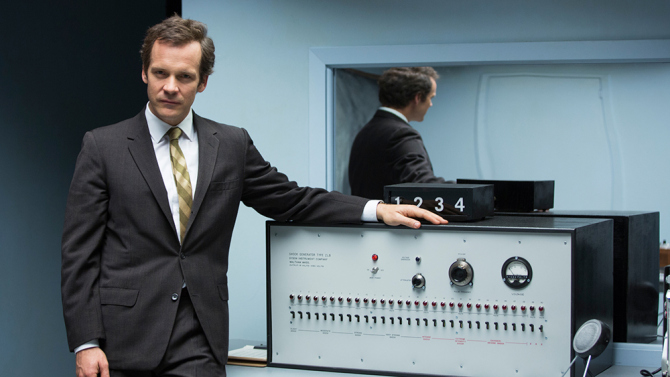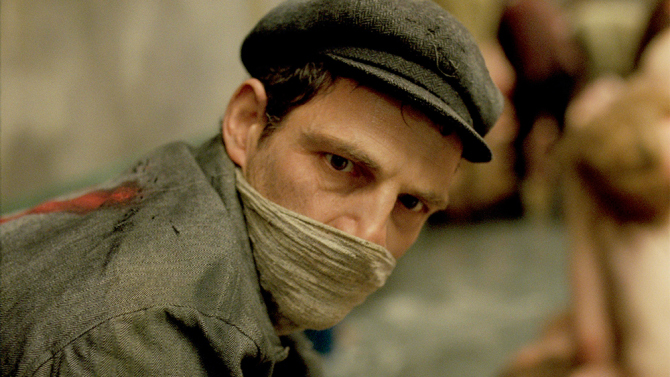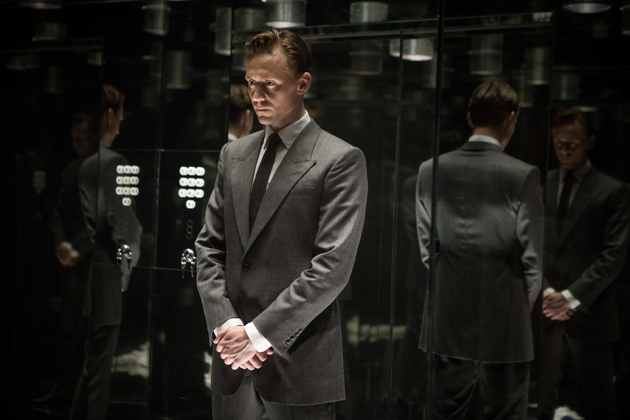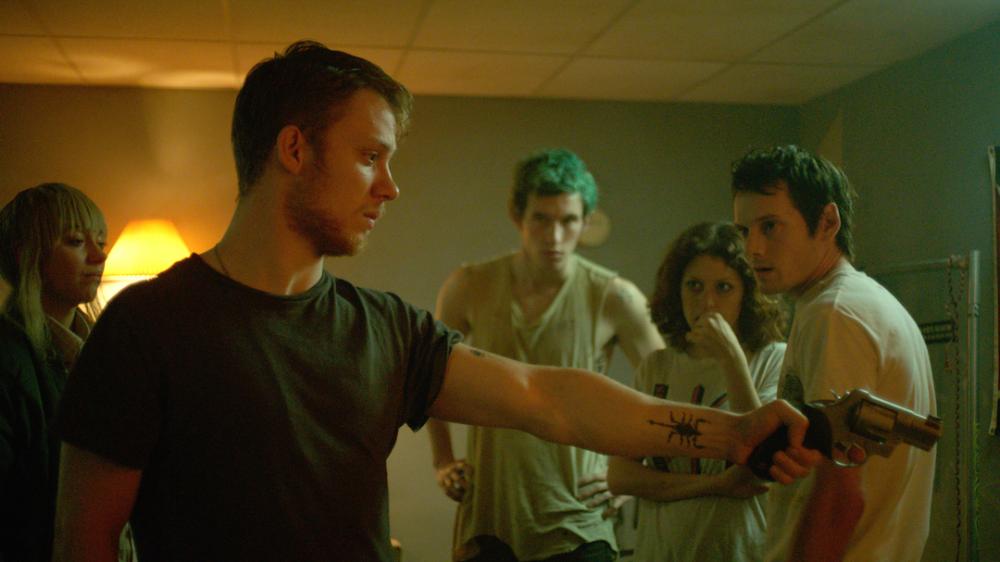8. Experimenter
Michael Almereyda’s (Nadja) latest film, Experimenter, is a visually and verbally spellbinding showpiece. Beginning in 1961 at Yale, renowned social psychologist Stanley Milgram (Peter Sarsgaard) wielded the baton on a series of psychological experiments in which subjects believed they were administering electrical shocks to an amiable and innocent subject in an adjacent room.
A lab-coated administrator would insist the subjects continue until the test was complete, despite audible pleas to stop the pain being inflicted. Most participants finished the test, knowingly they were inflicting needless pain, and this the trigger for one of the most invigorating, intelligent, and polemical pictures of the year.
Curiously structured with chronological to and fro, fourth wall asides, and arcs and eddies into surrealism, Almereyda still manages to present his treatise with an amenable charm. Experimenter is an old school indie arthouse saturnalia, a bracing tonic of a film, like Louis Malle’s My Dinner With Andre it haunts and hypnotizes, sending the audience away changed, troubled, and utterly impressed. (Full Review)
7. Room
An astonishing Jacob Tremblay stars as five-year-old Jack, who, along with his mother, Joy (Brie Larson, superb), make a soaring exodus from the one-room dungeon they’d been in for over half a decade in Room. Director Lenny Abrahamson (Frank) and screenwriter Emma Donoghue (Room is based off her 2010 novel) tell Jack and Joy’s harrowing story with great diligence and largesse, at once luminously simple, and persistently lyrical.
If it’s essential for a film’s greatness that it contain two or more indelible set-pieces; Room is teeming with them and harbors a moving and dactylic monument to maternal sufferance. (Full Review)
6. Son of Saul
Much to Hungarian director/screenwriter László Nemes credit, he manages to eschew all the usual Holocaust drama clichés in his heart-rending and brutal feature debut, Son of Saul.
Saul (Géza Röhrig, brilliant) is a Hungarian Jew forced to help the Nazis in Auschwitz where he is a Sonderkommando – concentration camp workers made up of prisoners – whose hellish charge is burning the dead.
Muscular long takes are choreographed intricately, and in ways that sometimes obscure or soften the focus, causing fright, uncertainty, and anxiousness in the viewer. Harrowing sequence after harrowing sequence is piled one over the other making for a gut-wrenching, disorienting experience as well as a masterclass in formalist technique.
As Son of Saul moves inexorably towards a gruelling and suspenseful finish, it raises alarms and requires such intense tenacity that we understand, maybe fleetingly, the endurance and bravery of broken men. A formalistic pièce de résistance. (Full Review)
5. High-Rise
British firebrand Ben Wheatley (Kill List) chose for his fifth feature film to adapt J.G. Ballard’s (Crash) skyscraping High-Rise, knowing full well the risks involved in raising such a structure. This is Thatcher’s England, 1975, and the denizens of a 40-storey luxury building will, over the course of three scant months, revert to ferocious barbarity, explore Freudian textbook extremes, and propound poetic self-destruction as Wheatley unleashes the beast.
Visually disturbing and hard-boiled vintage soon spurs an absurd cinematic carnival of petite bourgeoisie ideals, haut monde elitism, arraigned values, hamster cage clichés, standing aphorisms, and more. Drugging, boozing, orgies, beatings, lootings, rape, and murder, too, ensue.
As High-Rise grows progressively uncivilized and brutal, it also becomes more and more hypnagogic, the boldface emblems of politics, the gallows humor with a social conscience, all blur into a gloriously downbeat pageant, and a tour de force from a fearless filmmaker. (Full Review)
4. Anomalisa
Combining high ambition with near errorless achievement, Anomalisa is an intimate stop-motion moral story as well as an experiment in cinematic form. Directors Duke Johnson, and Charlie Kaufman (Synecdoche, New York) have undertaken a risky project here, one hinging on a nominal sketch, basically, and complete it with such a stunning success.
At first a rather mundane story about an author of popular books on customer service, voiced by David Thewlis, going on a business trip to Cincinnati lulls the viewer into an anxious ennui before making it into a weird Kafkaesque experience, with shades of Philip K. Dick – the influence we’ve most come to expect from Kaufman – that’s a little bit scary, as it should be.
Together Johnson and Kaufman have allowed themselves a simple, almost innocuous story – aspects of it feel deliberately incomplete – and still it carries a melody of carefully sequenced chords, concentus, and uncertain rhythms; notes from dreams, jewels dredged from the slough of a flowing well of creativity. (Full Review)
3. The Lobster
Marked, as it were, by merry invention, The Lobster manages to take many a dark detour in its drive down contentious cobblestones of social mores, dating rituals, courtship protocols and group polemic. Greek auteur Yorgos Lanthimos’ (Dogtooth) latest absurdist allegory is a distinct dystopian satire steeped in narrative tension.
The Lobster gets its epithet from its conscience-stricken central character, David (Colin Farrell), who has chosen the marine crustacean as the animal he will become if, after 45 days at the hotel resort he’s staying at, he hasn’t found a mate.
On this strange premise hangs Lanthimos’ strange, bleakly comedic tale, rich with a Samuel Beckett-like absurdism along with elements of the Théâtre du Grand-Guignol, and a significant fracturing of mimesis that doesn’t hollow out the efforts of The Lobster as a poignant love story. (Full Review)
2. Green Room
Offering a vicious punk rock variant on Rio Bravo, Jeremy Saulnier‘s (Blue Ruin) intense new film, Green Room, is catnip for extreme action thriller devotees.
Pat (Anton Yelchin) and his noisy punk band, The Ain’t Rights, are on the ass end of an awful tour, and a few shitty decisions have landed them a headline gig at a backwoods skinhead bar. “The crowd there leans a little right,” warned the sketchy promoter.
After they get through a bumpy performance, Pat and bandmate Sam (Alia Shawkat) witness something grisly in the eponymous green room and soon that same room is all that stands between them and a blood-simple, vicious, and well-armed Neo-Nazi syndicate, led by the vicious patriarchal Darcy (Patrick Stewart, terrifying).
One brazenly executed action sequence follows another as duress and bloodshed reach a fever pitch. The sustained intense onslaughts on our tapering protagonists effectively destroy any notions of assurance for the audience. In Green Room nothing is safe, survival is a fool’s paradise, and hope but a blink in a broken beer bottle.
A more thought-provoking and brilliantly paced horror film with so palpable a physicality is rare. Miss this movie at your own peril. (Full Review)
1. Entertainment
An erratic road movie perplexed by sad poetry, somber perceptions, and preyed upon by endless longing can be found in director Rick Alverson’s (The Comedy) fourth satisfyingly strange feature film, Entertainment.
As he wanders through a dusty, hard-hearted American landscape – mostly the Mojave Desert – a nameless antihero and ho-hum stand-up comic played by Gregg Turkington moves like a man thrown down, on a journey somewhere, maybe home. Alverson’s film is haunting, hypnotic, and disconcerting in succession.
There’s something fatalistic in Turkington’s almost somnambulistic drifting, his tenures in fleabag hotels, and filling stations, his curdled charm, and seemingly surreal asides with bereft eccentrics (including John C. Reilly, Jesus Lizard frontman David Yow, Amy Seimetz, and an incredibly creepy Michael Cera).
Turkington, in his cheapo suit, dripping sweat, stumbling through the desert, looks like a spurious Moses wandering the wastes of a soured American dream, with a folkloric quality.
Entertainment isn’t a movie that will be easily absorbed by conventional audiences, it’s sardonic and scornful and frequently factitious, and will appeal to a certain crowd for those exact same reasons. Alverson offers a fearless visual sense, a droll aphorism, and an odd ultramodern mastery, culminating in one of the boldest and imaginative American indie films in some time. A masterpiece. (Full Review)
Author Bio: Shane Scott-Travis is a film critic, screenwriter, comic book author/illustrator and cineaste. Currently residing in Vancouver, Canada, Shane can often be found at the cinema, the dog park, or off in a corner someplace, paraphrasing Groucho Marx. Follow Shane on Twitter @ShaneScottravis.







